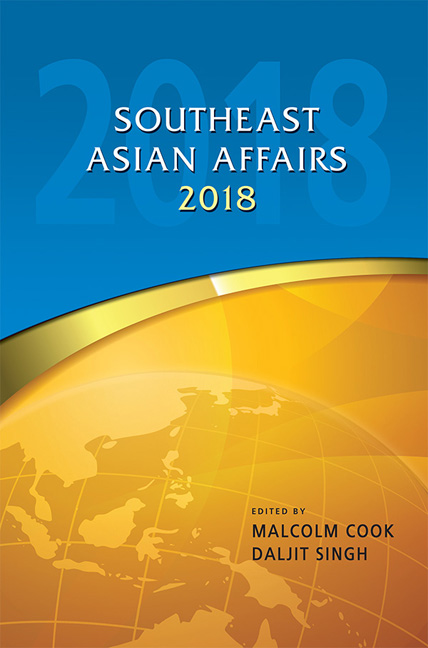Book contents
- Frontmatter
- Contents
- Introduction
- Acknowledgements
- THE REGION
- Notes on the Future of Southeast Asian Studies
- Southeast Asia on the Economic Front: Holding Steady, Bracing for Change
- Year One of the Trump Administration's Policy: Uncertainty and Continuity
- Southeast Asia in 2017: Grappling with Uncertainty
- BRUNEI DARUSSALAM
- CAMBODIA
- INDONESIA
- LAOS
- MALAYSIA
- MYANMAR
- THE PHILIPPINES
- SINGAPORE
- THAILAND
- TIMOR-LESTE
- VIETNAM
Year One of the Trump Administration's Policy: Uncertainty and Continuity
from THE REGION
Published online by Cambridge University Press: 08 June 2019
- Frontmatter
- Contents
- Introduction
- Acknowledgements
- THE REGION
- Notes on the Future of Southeast Asian Studies
- Southeast Asia on the Economic Front: Holding Steady, Bracing for Change
- Year One of the Trump Administration's Policy: Uncertainty and Continuity
- Southeast Asia in 2017: Grappling with Uncertainty
- BRUNEI DARUSSALAM
- CAMBODIA
- INDONESIA
- LAOS
- MALAYSIA
- MYANMAR
- THE PHILIPPINES
- SINGAPORE
- THAILAND
- TIMOR-LESTE
- VIETNAM
Summary
It seems like a distant memory now, but the first year of the Obama administration was an anxious one for many American Asia watchers. Those closest to the president, people who worked on his campaign, and people heartened by his boyhood connections to the region may have been confident about his professional interest in Asia. Those not in-the-know or disinclined to take too seriously the policy implications of his personal story were uncertain. The substance of President Obama's interest was also unclear. Asia policy was not a major theme of the campaign and he seemed ambivalent about its most important element — international trade.
Secretary of State Hillary Clinton went to Asia on her first overseas trip as secretary. It was a very positive statement about American interests. During the course of the visit, however, what made the most news was a remark in reference to China that the United States had to be careful not to let human rights interfere with its broader interests. Later in the year, President Obama compounded doubts about his administration's priorities by refusing a customary meeting with the Dalai Lama. The best reading of his reluctance was that he would soon be visiting China for the first time and did not want to spoil the prospects for a productive visit; the worst was that, as his first National Security Strategy would later indicate, he saw China as a partner more than a challenge. And when President Obama made his own visit that November, it was plagued by doubt. Given his interaction with the Chinese, many critics were concerned that he had been manipulated.
It was not until the Tokyo stop of this November swing through the region that President Obama committed the United States to joining negotiations on what would ultimately become central to his Asia policy — the Trans-Pacific Partnership (TPP). Until then, it was anything but certain whether he would endorse his predecessor's initiative. Similarly, until it was finalized in 2010, suspense surrounded the future of the U.S.–Korea Free Trade Agreement (KORUS), portions of which President Obama demanded be renegotiated as the price for his support.
The point of this recounting is not to evaluate the history of the previous administration but to contextualize the Trump administration's policy. The first year of a presidency is often an uncertain one.
- Type
- Chapter
- Information
- Southeast Asian Affairs 2018 , pp. 43 - 58Publisher: ISEAS–Yusof Ishak InstitutePrint publication year: 2018



